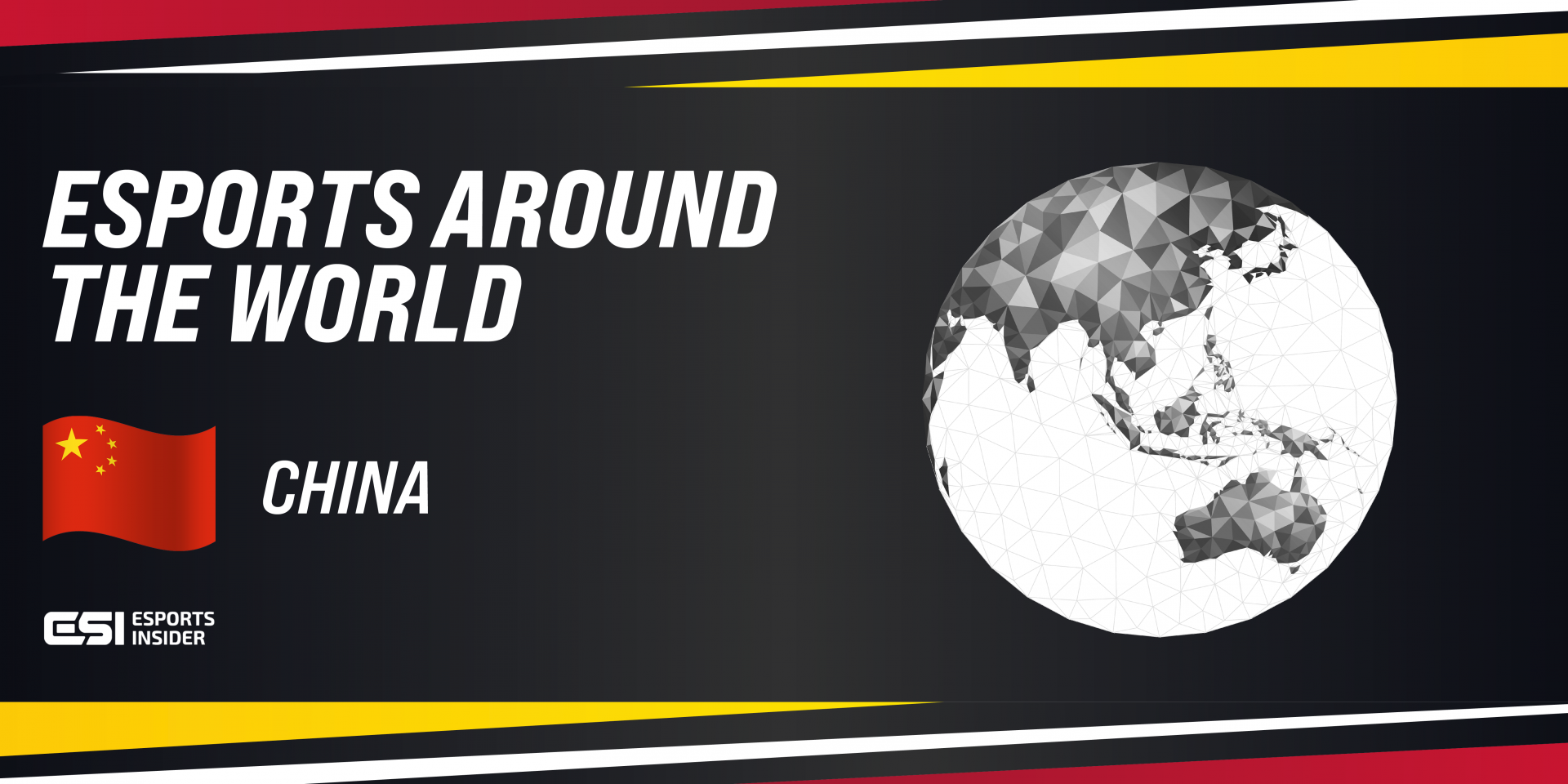Esports Around The World is a series of profiles outlining the esports ecosystem in various countries globally. The series ties into ESI’s international esports business event, which take place around the world.

Introduction
China, being one of the world’s largest economies, is also esports’ largest commercial market. During the last decade, China has cemented itself as one of the leaders in esports, game development, publishing and tournament organising. The country is home to world champions in a number of games, and some of the largest esports companies in the world.
China currently has the highest number of active esports players and is number one in esports title game revenue. China recognised esports as a sport back in the early 2000’s, one of the first governments to do so.
The biggest facilitator of growth for China and its esports market is the explosion of mobile esports. PC titles such as League of Legends, and mobile games including Honor of Kings and China-localised PUBG Mobile port Peacekeeper Elite, are very popular in the country.
With all numbers available pointing to a staggering size, China is, by most metrics, deserving of the title of ‘most esportsy nation’. China is home to the world’s biggest gaming company, Tencent, which fully owns Riot Games and has significant stakes in a myriad of other esports title publishers. Tencent is central to the development of esports in China. Moreover, Chinese tournament organiser VSPO is a major stakeholder within the Asian esports industry. Notably, it operates the King Pro League, Honor of King’s franchised league.
Lured by the size of its domestic esports market, a number of Western companies have dipped their toes into the ecosystem. Notable organisations such as G2 Esports and T1 — the latter of which topped Mailman’s 2023 China Digital Performance Index — tournament organisers, and even the Premier League football club Wolves have entered partnerships with Chinese leagues and brands.
Certain downsides are apparent, however, as the Chinese government has ushered in an unprecedented tightening of restrictions on video games in China. Since 2021, stringent restrictions (and enforcement) limit minors to one hour of online gaming time on Fridays, weekends and holidays only. This has had a knock-on effect on the country’s esports scene, restricting the talent pipeline and causing a drop in esports consumption by minors.
However, other sanctions on the gaming industry— such as a freeze on approvals of new video game titles — have recently been lifted. In December, the first batch of games in over 18 months were given the go-ahead in China, which included Riot Games’ VALORANT.
In January 2023, all titles from game developer Blizzard — including the highly domestically-popular Overwatch — went offline in China due to a breakdown in relations between the developer and its Chinese distribution partner NetEase. However, in July 2023, VALORANT officially launched in the country, which analysts say may capitalise on Overwatch’s absence.

Government Recognition
China’s General Administration of Sports has included esports as an official sport in the country since 2003. This makes China one of the earliest adopters of esports on an official, government level. By early 2019, China recognised esports as an official profession within the Ministry of Human Resources and Social Security‘s Occupation Skill Testing Authority recommendations.
There have been almost 100 official government documents by central and local governments in China focused on regulating and discussing esports, according to an article in the International Journal of Esports. Of the 100, ten are made on a central level, the highest level of government in China.

Notable Tournaments & Leagues
As the world’s preeminent esports market, and due to the massive size of its esports audience, China and its major cities like Shanghai are mainstays for some of the biggest tournaments and tournament circuits in esports. It has played host to several League of Legends World Championships, arguably the most important date in the esports calendar, alongside other major tournaments in Dota 2 and especially mobile esports.
Notable Esports Organisations
Note that this is a non-exhaustive list and exclusion does not signify an org is not notable.
| Bilibili Gaming | Invictus Gaming |
| Chongqing Wolves | LGD Gaming |
| Edward Gaming | Royal Never Give Up |
| FunPlus Phoenix | Tianba |
| JD Gaming | Weibo Gaming |

National Associations / Federations
China does not have an esports association. The Chinese esports ecosystem is partially administered by the General Administration of Sport of China (GASC), though since 2018 also the National Press and Publication Administration (NPPA), itself a part of the Ministry of Culture. However, neither of these bodies acts as an esports association.
While China does not have an ‘official’ domestic esports association, Tencent is a founding member of the Global Esports Federation (GEF), and China has influence in the Olympic Council of Asia (OCA), which empowers the Asian Electronic Sports Federation (AESF).

Education Initiatives
Dozens of Chinese universities have esports major courses after the Ministry of Education in China worked to add esports and gaming into higher education and vocational training curriculums. In 2016, “esports and management” was added to the Ministry of Education’s list of permitted college majors.
Some universities, like the Communication University of China, offer Majors directly related to esports, and numerous vocational schools also offer esports degree programmes or electives.
This is a preliminary country profile and will be augmented with additional information over time. If you have any suggestions or feedback for this profile, please get in touch at info@esportsinsider.com. This article was last updated on July 14th, 2023.
